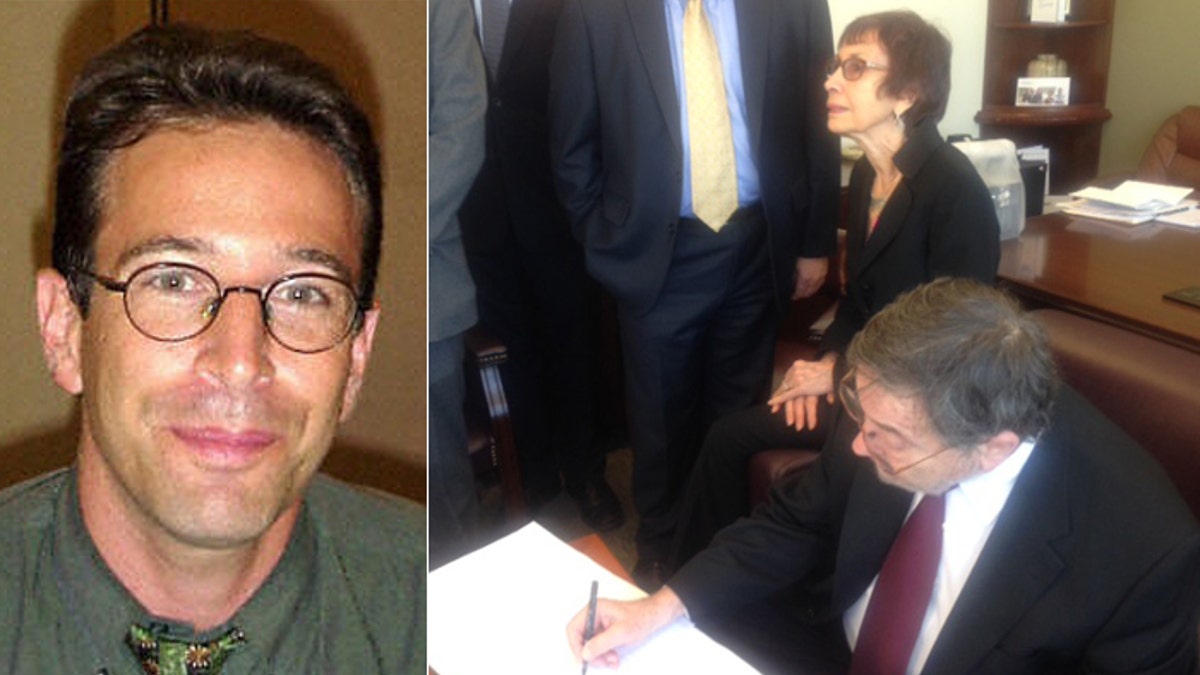
The parents of Daniel Pearl, (l.), who was killed in 2002, said as they signed a condolence book for Pakistani terror victims they believe the Guantanamo detainees must face justice. (AP, FoxNews.com)
Judea and Ruth Pearl could not turn down the invitation Tuesday to show their support and sympathy for 148 people - 132 children - slaughtered by the Taliban in the same lawless nation where their son was killed more than a dozen years ago.
The Dec. 16 attack at a military school in Peshawar, a city about 75 miles from the country's capital, Islamabad, has torn the mostly Muslim nation apart, but it brought a sadly familiar feeling to the Pearls, whose journalist son was killed in what would eerily foreshadow a decade of mindless brutality that engulfed much of the Middle East.
"Today, we are in worse shape than we were 12 years ago," Ruth Pearl told Pakistani officials and members of an interfaith group that attended the event at the Los Angeles Pakistani consulate. "Let’s hope that can be changed."
[pullquote]
Daniel Pearl was a young Wall Street Journal reporter and expectant father when he went to Pakistan to investigate Al Qaeda. Promised an interview with key officials in the terror network, he was instead kidnapped and then, in a video that shocked the civilized world and ushered in a new era of barbarity by Islamic fanatics, was beheaded on Feb. 1, 2002, in a scene captured in a sickening video released on the Internet. The man who would later admit doing the savage deed was none other than 9/11 mastermind and future Guantanamo detainee Khalid Sheikh Mohammed.
More beheadings would follow, but the brutal form of execution has become even more prevalent in the last year as the favored form of killing by Islamic State. Each beheading of a western journalist or aid worker has brought back the horrific memory of their son's death, and unspeakable acts of terror like last week's attack leave them wondering if it will ever cease.
"It is the norm, you get accustomed to it," said Judea Pearl, a computer science professor at UCLA who with his wife signed a condolence book for the Taliban's victims. "You get accustomed to read about it in the newspaper or see another video, it becomes part of our life. You forget that it wasn’t normal. But they managed to make it a normal part of brutality. Brutality is penetrating our bloodstream without us knowing."
Pakistan Consulate General Hamid Asghar told the gathering the time for pacifism has past, echoing sentiments that have come out of Pakistan since the attack.
"I fear we have been brought to a point where the eradication of this vermin is the only way forward," he said.
Judea Pearl said he recalled Pakistanis reaching out to him after his son was murdered, and felt a strong obligation to repay their kindness.
"I remembered such gestures helped us in our tragedy, made us feel like the world is with us in the sense that the world is making a step not to allow it to continue," he said. "But the world did allow it to continue. But at that time it felt like a turning point, and every grieving family should feel that way. That the sacrifice made was a turning point."
